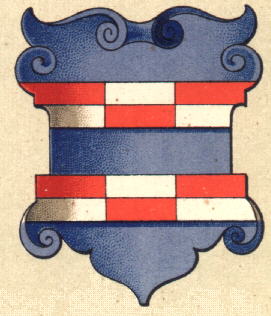Kingdom of Lodomeria: Difference between revisions
Jump to navigation
Jump to search
Knorrepoes (talk | contribs) (Created page with '{|width="100%" style="color:black; background-color:#ffffcc;" |width="15%"|50 px|left |width="70%" align="center" |'''Heraldry of the World<br>Civic heraldry…') |
Knorrepoes (talk | contribs) m (Text replace - "'''Origin/meaning :'''<br>" to "====Origin/meaning====") |
||
| Line 9: | Line 9: | ||
[[File:lodomeri.ahe.jpg|center]] | [[File:lodomeri.ahe.jpg|center]] | ||
====Origin/meaning==== | |||
The Kingdom of Lodomeria (Wlodzirmierz, the capital city with the same name now is part of Ukraine) never really existed. The territory Wlodirmircz became part of Poland in 1340. The territory was claimed by the Hungarian Kings, who created the symbolic title. The arms were added to the Hungarian arms in 1252 by King Bela. After the Polish division in 1772 the area became part of Austria-Hungary. The meaning or origin of the arms is not known. | The Kingdom of Lodomeria (Wlodzirmierz, the capital city with the same name now is part of Ukraine) never really existed. The territory Wlodirmircz became part of Poland in 1340. The territory was claimed by the Hungarian Kings, who created the symbolic title. The arms were added to the Hungarian arms in 1252 by King Bela. After the Polish division in 1772 the area became part of Austria-Hungary. The meaning or origin of the arms is not known. | ||
Revision as of 19:22, 1 April 2012
| Heraldry of the World Civic heraldry of the Austro-Hungarian Empire |
KINGDOM OF LODOMERIA
Origin/meaning
The Kingdom of Lodomeria (Wlodzirmierz, the capital city with the same name now is part of Ukraine) never really existed. The territory Wlodirmircz became part of Poland in 1340. The territory was claimed by the Hungarian Kings, who created the symbolic title. The arms were added to the Hungarian arms in 1252 by King Bela. After the Polish division in 1772 the area became part of Austria-Hungary. The meaning or origin of the arms is not known.
Literature : Ströhl, 1890
